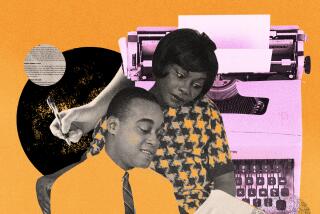Papers Receive Low Grades in Journalist Poll
- Share via
Two out of every three newspaper journalists believe that their profession has a “serious” credibility problem but believe that the problem is correctable, according to a new study of press credibility released Tuesday.
The study also found that many newspaper journalists hold the quality and reliability of their newspapers’ reporting in low regard. Fewer than half the journalists surveyed rated the quality of reporting in their newspaper as “good.” Fewer than half said they consider their paper’s coverage of such issues as abortion, Israel, Latin America, the Soviet Union or Arab countries to be “reliable.”
The study was commissioned by the Associated Press Managing Editors Assn. and was made public at the group’s annual convention in San Francisco.
1,333 Journalists Polled
The survey, which polled 1,333 journalists on 51 newspapers, was coupled with a similar study of public attitudes toward the press commissioned last spring by the American Society of Newspaper Editors.
Generally the two studies revealed that the public holds a lower opinion of newspapers than journalists do. On the question of the quality of reporting, however, more of the general public rated newspapers as “good” than journalists did, 59% to 49%.
The public also gave newspapers more credit for patriotism than journalists give themselves. Roughly 62% of the public considered newspapers patriotic, and 52% of newspaper journalists thought so.
Forty-two percent of newspaper journalists considered reporters “well trained” for their jobs, less than the 48% among the public in general.
The study also suggested that younger newspaper journalists may contribute disproportionately to the newspaper industry’s credibility problems. Although dedicated to their careers, the study said, these “younger transients” tend to be more restless, more critical and less committed to either their newspapers or their communities than their predecessors.
Stake in Communities
Older journalists, the study suggested, tend to feel a greater stake in their communities and more concern about the effect of their stories.
The studies also revealed differences between journalists and the public at large in political orientation. The study found that 30% of journalists surveyed consider themselves “liberal,” compared to 15% in last spring’s survey of public attitudes. Roughly 10% of journalists considered themselves “conservative,” compared to 26% among the public.
More journalists considered themselves “moderate,” however, than the public at large, 38% compared to 27%.
At the same time, 42% of the journalists surveyed considered themselves Democrats, slightly more than the 37% of the general public. The study found that 15% of the journalists considered themselves Republicans, compared to 31% among the general public.
The study is one of several recent efforts surveying press credibility and its reflection of the general public in personal and political attitudes. Journalists disagree over whether the results of such studies reveal anything new or whether the press has always toiled amid a mixture of dependence and distrust.
A Los Angeles Times poll published in August came to similar conclusions about differences between journalists and their readers.
In that survey, The Times found that 55% of journalists surveyed nationally considered themselves liberal, compared to 24% for their readers. About 17% of journalists called themselves conservative, compared to 29% of their readers, and 26% of journalists described themselves as middle-of-the-road, compared to 33% of their readers.
The Associated Press Managing Editors Assn. study suggested several ways the press can help solve its credibility problems. One is to make younger journalists feel they have a larger stake in their communities.
‘Reader Distrust’
Another is to focus efforts on coverage that could breed “reader distrust.” The study said, for instance, “Examine the goals of investigative reporting, and limit the use of reporting techniques that are criticized by both journalists and the public.”
The study also said newspapers need to “educate the public” about the “watchdog” role of the press.
More to Read
Sign up for Essential California
The most important California stories and recommendations in your inbox every morning.
You may occasionally receive promotional content from the Los Angeles Times.










